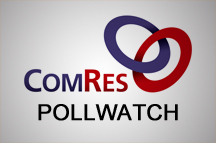The latest ComRes poll, published on Wednesday, shows the Conservatives and Labour tied on 35% each. But, with less than a week to go and all the major television set pieces behind us, should we be watching out for any late swing?
A Major Comparison
Labour perform better in this poll than in much of our recent polling, which has been showing a Conservative lead, although Labour have still not held a lead in any of our phone polls this year.

Indeed, with the Conservatives ahead in numerous recent polls, comparisons with 1992 seem to be ever more frequent in the commentariat. In particular, we’re seeing more and more talk of “late swing” and the parallels with John Major’s victory in 1992, where he trailed in the polls.
As my colleague Adam Ludlow recently highlighted, however, any Conservative lead evident in recent weeks may not represent “late swing”: telephone polls have been showing a Conservative lead since the turn of the year. Wednesday’s ComRes poll does not change the overall trend. Be wary, therefore, of jumping to premature conclusions about a “late swing” to the Tories in the national polls.

Further Grist to the Mill
Rather than analysing national polls, a more useful way of reading the tea leaves may be to focus on key “battlegrounds” around the country. This election, perhaps more than any other in recent memory, is being determined by striking regional trends, as recent ComRes polls in Scotland, the South West and key Conservative-held UKIP target seats have shown.
Our latest battleground study provides valuable further grist to the Pollwatcher’s mill. Last weekend we looked at the 50 most marginal Conservative-held seats where Labour came second in 2010 – in other words, seats that Ed Miliband’s party really needs to win if he is to have a chance of entering Downing Street. These seats have added importance because of the picture in Scotland, where Labour stand to lose most of their seats to the SNP - their gains in England and Wales will need to be larger than their Scottish losses if they are to win power.
The evidence is encouraging for Mr Miliband – his party are currently three points ahead of the Tories across these seats. If swing were to be distributed uniformly across these seats (a fiction, but a useful one), this could potentially see Labour winning 40 of these 50 seats.

There is some comfort for David Cameron at the same time, however. Recent Conservative attacks on the potential role of the SNP in a future Labour government are definitely cutting through: around half of voters in these key swing seats (47%) say that the SNP should be kept out of a UK-wide government, including three in ten planning to vote Labour.

Will these attacks produce a “late swing” for the Conservatives? As highlighted above, this swing may already have happened.
However, with two in five likely voters (41%) either still not knowing who they will vote for or saying that they may yet change their mind, Messrs Miliband and Cameron will both be hoping that they can claim just a few more votes between now and polling day. Every vote will count.
Author:
Tom Clarkson
Research Team Leader
More information:
To sign up to receive the ComRes Pollwatch via email please visit their website.














